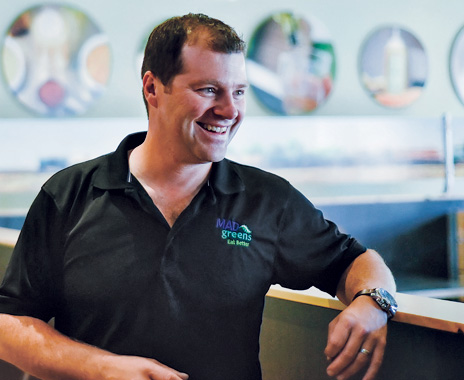If a recent spate of large-scale investments is any indication, the new crop of Fast Casual 2.0 restaurants—with their chef-driven menus and next-level ingredients—is piquing the interests of private equity firms. And this new interest in these premium concepts could propel the category to the next level of nationwide growth.
Marley Hodgson, cofounder of Colorado-based MAD Greens, says the positioning of the Fast Casual 2.0 segment doesn’t just resonate with younger consumers, but it also connects with what has turned out to be a larger shift in how people are eating in this country. An early driver behind the focus on healthy food options, MAD Greens received a new round of funding ($13 million) from 9th Street Capital late last year.
A brand’s connection to its local communities—often exemplified in how it sources ingredients, partners with local businesses, or maintains a mission beyond profits—often results in enthusiastic customers.
“I think the blend of all those things together allows concepts like MAD Greens and others to strike a chord,” Hodgson says. “It’s very interesting to private equity because they see those brands as being very on point for the future.”
Washington, D.C.–based Cava Grill’s approach to Greek and Mediterranean cuisine—featuring a menu of upscale items such as seasonal roasted vegetables—attracted a $45 million investment last year from equity partners Invus and Revolution Growth, as well as an additional $16 million from an existing partner. CEO Brett Schulman believes the quick-service and fast-casual industries are experiencing a massive disruption, with consumers clamoring for fresh, high-quality ingredients in an affordable and fast format.
“Why can’t it be great, high-quality, culinary-driven food that’s served quickly and is still accessible from a price standpoint?” Schulman says. Regarding private equity firms’ interest in the space, Schulman adds, “I think they see the opportunity to build a transformational business to take advantage of this massive shift in the way people are eating.”
While searching for an institutional partner, Illinois-based Naf Naf Grill connected with Roark Capital Group. Roark co-CEO David Sloan says the firm believed in what the brand was trying to create. Naf Naf Grill, which specializes in savory Middle Eastern fare, was also built around being a concept “that can evolve into something really great, not only with our food and our people, but also with our culture. And Roark really believed in that,” Sloan says.
A trait common to many Fast Casual 2.0 brands is the intention to expand through corporate-owned stores rather than using the conventional franchise model. That approach often translates into the need for an equity partner.
“When you’re building stores all by yourself and not relying on franchisees to build them, it’s more capital intensive,” Schulman says, adding that investors can provide those resources.
Though there are many benefits to bringing in capital without taking on franchisees, Hodgson warns there may also be pitfalls in following the private equity route. Decisions made by the brand’s management team might be aimed at the long-term health of the company, while potential partners may be more interested in short-term goals.
“You must make sure the funding partner has the same vision and patience to go through this,” Hodgson says. If the brand has this vision, but the private equity partner does not, friction is likely to be an ongoing challenge, he says.
With the need for private equity funding comes the potential for multiple investment partners. Ensuring a productive relationship among the various parties—internal as well as external—is crucial. In addition to its partnership with Roark, Naf Naf’s other investors include family, friends, and wealthy individuals who were customers at the brand’s first restaurant.
Sloan says that when brands work to be honest and transparent and keep communications open, it’s easier for everybody to work toward a common goal. That’s the approach his team has used all along, and it has proved effective in moving the company—and its investors—forward.
Developing a mixture of multiple investment partners doesn’t just bring in the money; it can also bring in much-needed expertise.
“It’s been great, because they are all a little bit different in their own ways, whether it’s in their fund structure or the industries they’re invested in,” Schulman says of Cava Grill’s various partners. “They bring a great diversity of experience and perspective that has been tremendous for us to be able to leverage.” He adds that the team’s collaborative approach has been a big success.
Sloan says the industry should expect to see more large-scale investments in the Fast Casual 2.0 space. He adds that customers are also increasingly interested in what a brand represents and the culture it holds—something many new chef-driven concepts embody. Consumers are also seeking out new flavors and new foods, or the “new ways of doing the common item we all eat,” as Sloan puts it.
“It’s what consumers are demanding, and I think the private equity money will follow that demand,” Sloan says.








